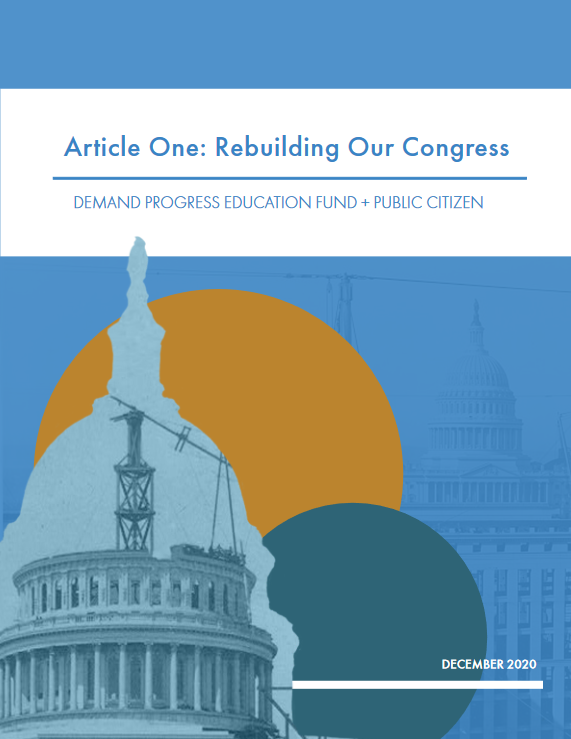What is the proper role of the Legislative branch in our system of government? How exactly has Congress been undermined and how might it restore its strength? Demand Progress Education Fund and Public Citizen are proud to announce our new report, “Article One: Rebuilding Our Congress,” which expands upon these questions and outlines what has happened, and why.
Our purpose is to tell the story—using numbers and data—about the dysfunction of our Legislative branch and the dangers that dysfunction poses to our democracy. We focus on four major areas that relate to the diminishment of Congressional power: (1) Congressional Capacity and Modernization, (2) Executive Branch Oversight, (3) Foreign Policy and National Security, and (4) The Power of the Purse.
Contrary to the expectations of the framers of the Constitution, who thought the Legislative branch would become the most powerful and dangerous part of the government, today’s Congress has been significantly undermined both in its exercise of power and in its reputation among the American people. Over the last three decades, Congress has ceded many of its constitutionally delegated authorities, weakened its institutional infrastructure, and concentrated most of its remaining power in congressional leadership.
The ideological, partisan, and personal incentives of key institutional players have produced our current political system in which power is consolidated under the Executive branch, effectively undermining the central role of the Legislative branch: to act as a check on concentrated government power. The framers did not anticipate the current power of our central government, the ‘imperial’ nature of our presidency, and the willingness of legislators to sabotage the Legislative branch and accede power to the Executive. To restore the vigor of the Legislative branch, we start by analyzing four major areas of current congressional failure.
In “Congressional Capacity and Modernization,” we identify various instances of congressional underfunding and argue that budget cuts have significant ramifications on the capacity of the Legislative branch to serve its function. Systemic funding cuts to congressional personal offices and committees have resulted in inexperienced staff and high staff turnover in addition to the increasing influence of lobbyists and a fundamental shift from policymaking to showmanship. Outdated technologies, legislative procedures, and systems of collaboration have left members of Congress under-resourced and thus vulnerable to external sources of power.
In “Executive Branch Oversight,” we argue that Congress has ceded to the Executive branch many of the tools it needs to hold agencies accountable. Subpoena authority and contempt powers in the House and Senate have become defunct—in other words, the Legislative branch can no longer compel the Executive branch to be held to account. Support agencies in the Legislative branch have minimal access to the information needed to support congressional activities, weakening their capacity to serve as watchdogs.
We identify the current institutional framework for congressional oversight and the causes of its decline in “Foreign Policy and National Security.” Here, we offer options to Congress to rebuild its oversight capacity—such as enhancing congressional staff capabilities, strengthening subpoena power, modifying legislative procedures, redressing foreign assistance authorizing legislation, facilitating information sharing, and ensuring that congressional staff have appropriate clearances.
Finally, we describe the overreach of Executive branch power into the Legislative branch’s ability to make spending decisions. We offer six ways for Congress to reassert its power: withholding salaries, requiring congressional approval of emergency declarations, expediting review, requiring congressional approval of rescissions, enhancing transparency, and strengthening the Government Accountability Office.
Recent decades have seen a shift in power to the president, to concentrated wealth, and to the elites. In many ways, this is a return to our roots, where a handful ruled the many. This modern version of this system of government, with the trappings but not the actuality of democratic governance, is known as illiberal democracy. It is an outcome we must avoid. We hope our report provides useful handholds to grapple with the problem.
Read: Article One: Rebuilding Our Congress
